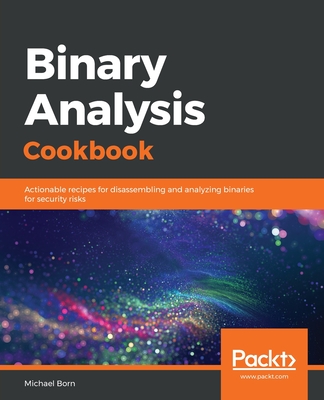Practical Binary Analysis: Build Your Own Linux Tools for Binary Instrumentation, Analysis, and Disassembly (Paperback)
暫譯: 實用的二進位分析:為二進位工具、分析與反組譯建立自己的 Linux 工具 (平裝本)
Dennis Andriesse
- 出版商: No Starch Press
- 出版日期: 2018-12-11
- 售價: $1,750
- 貴賓價: 9.5 折 $1,663
- 語言: 英文
- 頁數: 456
- 裝訂: Paperback
- ISBN: 1593279124
- ISBN-13: 9781593279127
-
相關分類:
Linux、Assembly
-
相關翻譯:
二進制分析實戰 (簡中版)
立即出貨 (庫存 < 4)
買這商品的人也買了...
-
 $199Foundations of Ajax (Paperback)
$199Foundations of Ajax (Paperback) -
 Writing Security Tools and Exploits
Writing Security Tools and Exploits$2,220$2,109 -
 $1,089An Introduction to Design Patterns in C++ with Qt 4
$1,089An Introduction to Design Patterns in C++ with Qt 4 -
 Practical Malware Analysis: The Hands-On Guide to Dissecting Malicious Software (Paperback)
Practical Malware Analysis: The Hands-On Guide to Dissecting Malicious Software (Paperback)$2,240$2,128 -
 $4,731Embedded SoPC Design with Nios II Processor and Verilog Examples (dhl)
$4,731Embedded SoPC Design with Nios II Processor and Verilog Examples (dhl) -
 Binary Hacks -- 駭客秘傳技巧一百招
Binary Hacks -- 駭客秘傳技巧一百招$580$458 -
 $1,620Learning Linux Binary Analysis (Paperback)
$1,620Learning Linux Binary Analysis (Paperback) -
 Building Embedded Systems: Programmable
Building Embedded Systems: Programmable$2,500$2,375 -
 $147數學之美, 2/e
$147數學之美, 2/e -
 Attacking Network Protocols: A Hacker's Guide to Capture, Analysis, and Exploitation (Paperback)
Attacking Network Protocols: A Hacker's Guide to Capture, Analysis, and Exploitation (Paperback)$1,780$1,691 -
 Malware Data Science: Attack Detection and Attribution
Malware Data Science: Attack Detection and Attribution$1,700$1,615 -
 加密與解密, 4/e
加密與解密, 4/e$1,188$1,129 -
 Attacking Network Protocols|王牌駭客的網路攻防手法大公開 (Attacking Network Protocols: A Hacker's Guide to Capture, Analysis, and Exploitation)
Attacking Network Protocols|王牌駭客的網路攻防手法大公開 (Attacking Network Protocols: A Hacker's Guide to Capture, Analysis, and Exploitation)$480$379 -
 比特幣標準|中央銀行的去中心化替代方案 (The Bitcoin Standard: The Decentralized Alternative to Central Banking)
比特幣標準|中央銀行的去中心化替代方案 (The Bitcoin Standard: The Decentralized Alternative to Central Banking)$480$379 -
 Rootkits and Bootkits: Reversing Modern Malware and Next Generation Threats
Rootkits and Bootkits: Reversing Modern Malware and Next Generation Threats$1,750$1,663 -
 $1,890C++ Crash Course : A Fast-Paced Introduction (Paperback)
$1,890C++ Crash Course : A Fast-Paced Introduction (Paperback) -
 Binary Analysis Cookbook
Binary Analysis Cookbook$1,670$1,587 -
 $1,040C++ for Lazy Programmers: Quick, Easy, and Fun C++ for Beginners
$1,040C++ for Lazy Programmers: Quick, Easy, and Fun C++ for Beginners -
 Beginning X64 Assembly Programming: From Novice to Avx Professional (Paperback)
Beginning X64 Assembly Programming: From Novice to Avx Professional (Paperback)$1,410$1,340 -
 C and C++ Under the Hood (Paperback)
C and C++ Under the Hood (Paperback)$1,260$1,197 -
 黑客之道 : 漏洞發掘的藝術, 2/e (Hacking: The Art of Exploitation, 2/e)
黑客之道 : 漏洞發掘的藝術, 2/e (Hacking: The Art of Exploitation, 2/e)$714$678 -
 軟體架構原理|工程方法 (Fundamentals of Software Architecture: A Comprehensive Guide to Patterns, Characteristics, and Best Practices)
軟體架構原理|工程方法 (Fundamentals of Software Architecture: A Comprehensive Guide to Patterns, Characteristics, and Best Practices)$680$537 -
 Windows APT Warfare:惡意程式前線戰術指南
Windows APT Warfare:惡意程式前線戰術指南$600$420 -
 深入淺出設計模式, 2/e (Head First Design Patterns: Building Extensible and Maintainable Object-Oriented Software, 2/e)
深入淺出設計模式, 2/e (Head First Design Patterns: Building Extensible and Maintainable Object-Oriented Software, 2/e)$980$774 -
 實戰 Linux 系統數位鑑識 (Practical Linux Forensics: A Guide for Digital Investigators)
實戰 Linux 系統數位鑑識 (Practical Linux Forensics: A Guide for Digital Investigators)$620$490
相關主題
商品描述
Stop manually analyzing binary! Practical Binary Analysis is the first book of its kind to present advanced binary analysis topics, such as binary instrumentation, dynamic taint analysis, and symbolic execution, in an accessible way.
As malware increasingly obfuscates itself and applies anti-analysis techniques to thwart our analysis, we need more sophisticated methods that allow us to raise that dark curtain designed to keep us out--binary analysis can help. The goal of all binary analysis is to determine (and possibly modify) the true properties of binary programs to understand what they really do, rather than what we think they should do. While reverse engineering and disassembly are critical first steps in many forms of binary analysis, there is much more to be learned.
This hands-on guide teaches you how to tackle the fascinating but challenging topics of binary analysis and instrumentation and helps you become proficient in an area typically only mastered by a small group of expert hackers. It will take you from basic concepts to state-of-the-art methods as you dig into topics like code injection, disassembly, dynamic taint analysis, and binary instrumentation. Written for security engineers, hackers, and those with a basic working knowledge of C/C++ and x86-64, Practical Binary Analysis will teach you in-depth how binary programs work and help you acquire the tools and techniques needed to gain more control and insight into binary programs.
Once you've completed an introduction to basic binary formats, you'll learn how to analyze binaries using techniques like the GNU/Linux binary analysis toolchain, disassembly, and code injection. You'll then go on to implement profiling tools with Pin and learn how to build your own dynamic taint analysis tools with libdft and symbolic execution tools using Triton. You'll learn how to:
- Parse ELF and PE binaries and build a binary loader with libbfd
- Use data-flow analysis techniques like program tracing, slicing, and reaching definitions analysis to reason about runtime flow of your programs
- Modify ELF binaries with techniques like parasitic code injection and hex editing
- Build custom disassembly tools with Capstone
- Use binary instrumentation to circumvent anti-analysis tricks commonly used by malware
- Apply taint analysis to detect control hijacking and data leak attacks
- Use symbolic execution to build automatic exploitation tools
With exercises at the end of each chapter to help solidify your skills, you'll go from understanding basic assembly to performing some of the most sophisticated binary analysis and instrumentation. Practical Binary Analysis gives you what you need to work effectively with binary programs and transform your knowledge from basic understanding to expert-level proficiency.
商品描述(中文翻譯)
停止手動分析二進位檔!《實用二進位分析》是首本以易於理解的方式呈現進階二進位分析主題的書籍,包括二進位儀器化、動態污點分析和符號執行等。
隨著惡意軟體越來越多地進行混淆並應用反分析技術來阻礙我們的分析,我們需要更複雜的方法來揭開那層旨在阻止我們的黑幕——二進位分析可以提供幫助。所有二進位分析的目標是確定(並可能修改)二進位程式的真實屬性,以了解它們實際上在做什麼,而不是我們認為它們應該做什麼。雖然逆向工程和反組譯是許多形式的二進位分析中的關鍵第一步,但還有更多的知識可以學習。
這本實用指南教你如何應對二進位分析和儀器化這些迷人但具挑戰性的主題,並幫助你在這個通常只有少數專家駭客掌握的領域中變得熟練。它將帶你從基本概念進入最先進的方法,深入探討如程式碼注入、反組譯、動態污點分析和二進位儀器化等主題。這本書是為安全工程師、駭客以及具備基本 C/C++ 和 x86-64 知識的人士所寫,《實用二進位分析》將深入教你二進位程式的運作方式,並幫助你獲得更多控制和洞察二進位程式所需的工具和技術。
在完成基本二進位格式的介紹後,你將學會如何使用 GNU/Linux 二進位分析工具鏈、反組譯和程式碼注入等技術來分析二進位檔。接著,你將實作使用 Pin 的分析工具,並學習如何使用 libdft 建立自己的動態污點分析工具,以及使用 Triton 的符號執行工具。你將學會如何:
- 解析 ELF 和 PE 二進位檔,並使用 libbfd 建立二進位載入器
- 使用資料流分析技術,如程式追蹤、切片和達成定義分析,推理程式的執行流程
- 使用寄生程式碼注入和十六進位編輯等技術修改 ELF 二進位檔
- 使用 Capstone 建立自訂的反組譯工具
- 使用二進位儀器化來繞過惡意軟體常用的反分析技巧
- 應用污點分析來檢測控制劫持和資料洩漏攻擊
- 使用符號執行來建立自動化利用工具
每章結尾都有練習題幫助鞏固你的技能,讓你從理解基本組合語言到執行一些最複雜的二進位分析和儀器化。《實用二進位分析》提供你有效處理二進位程式所需的知識,並將你的理解從基本知識轉變為專家級的熟練度。















